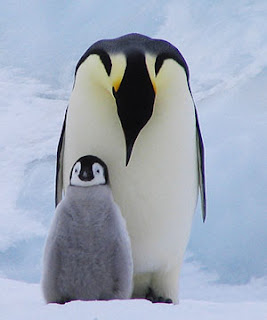 Although March of the Penguins is a documentary of sorts distributed by National Geographic Feature Films, I was pleasantly surprised to see that the feature itself had no major evolutionary overtones. Even the introduction mentions the penguins’ mating pattern as an event occurring for thousands of years (which is possible in consideration of a creationist worldview and post-flood animal activity). While the narrator, Morgan Freeman, does reference the continent (Antarctica) as having floated further away from the others toward the South Pole over time, and this likely to support the idea of Pangaea (the theory that the continents originally all were connected and floated apart over time [which is absurd, because if you removed the waters from the Earth you would find the continents are still connected and any continental shifting or rearrangement can be accounted for by the Flood]), he does not dwell on this point, but rather quickly moves on. While this is the case for the feature film, one of the special features called Of Penguins and Men has a massive amount of propaganda supporting both evolution and global warming. As most will likely not watch this, I can at least be satisfied with the feature itself (March of the Penguins).
Although March of the Penguins is a documentary of sorts distributed by National Geographic Feature Films, I was pleasantly surprised to see that the feature itself had no major evolutionary overtones. Even the introduction mentions the penguins’ mating pattern as an event occurring for thousands of years (which is possible in consideration of a creationist worldview and post-flood animal activity). While the narrator, Morgan Freeman, does reference the continent (Antarctica) as having floated further away from the others toward the South Pole over time, and this likely to support the idea of Pangaea (the theory that the continents originally all were connected and floated apart over time [which is absurd, because if you removed the waters from the Earth you would find the continents are still connected and any continental shifting or rearrangement can be accounted for by the Flood]), he does not dwell on this point, but rather quickly moves on. While this is the case for the feature film, one of the special features called Of Penguins and Men has a massive amount of propaganda supporting both evolution and global warming. As most will likely not watch this, I can at least be satisfied with the feature itself (March of the Penguins).An adult Emperor Penguin’s ability to survive the long trek from the sea to the mating grounds
The capability of the adult to find a suitable mate
The transferability of the fertilized egg from the mother to the father
The mother’s ability to survive the long trek from the mating grounds to the sea to feed
The mother’s ability to survive predators during feeding to make it back to the mating grounds
The father’s ability to survive the sub-zero temperatures, frozen winds, and dark winter
The father’s ability to starve and wait for the mother’s return to the mating grounds
The transferability of the chick from the father to the mother in the frozen climate
The father’s ability to repeat the sequence the mother has regarding food, survival, and return
The chick’s ability to avoid predators
The father and mother’s ability to take turns feeding the chick while he grows
The chick’s ability to feed and avoid predators for the first 4-5 years in the sea prior to mating
The chick’s ability to repeat the mating process over the next 15-20 years until death





No comments:
Post a Comment